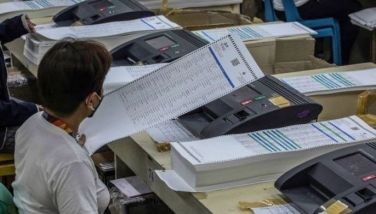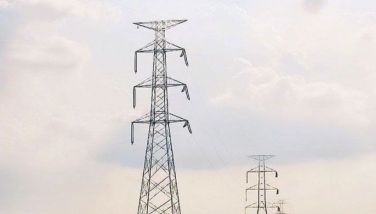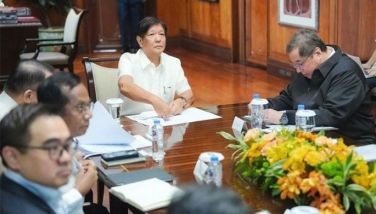Gov’t suspends NDF immunity privileges
August 4, 2005 | 12:00am
The government suspended yesterday the safety guarantees that shield nearly 100 communist rebel negotiators and their consultants from arrest after the National Democratic Front (NDF) reportedly backed out of peace talks.
The NDF is the political arm of the Communist Party of the Philippines (CPP). With the safety passes rebel leaders were allowed to travel to and from the Norwegian-brokered talks in Oslo.
Executive Secretary Eduardo Ermita said government negotiators would notify communists rebel leaders still in exile in the Netherlands that the suspension of safety guarantees will take effect in 30 days.
"It takes two sides to talk peace, and if one side has withdrawn, there is no more justification for the rebel guarantees," he told a news conference, adding that "an abandonment of the talks is an abandonment of the people."
Left-wing lawmaker Satur Ocampo, a former communist rebel leader, said the government’s move was a major setback and could hurt the prospect of reopening negotiations.
"This is an abandonment of President Arroyo’s program to complete peace negotiations by 2010," he said. Ermita said the Armed Forces and the Philippine National Police will arrest communist rebel leaders after the 30-day period lapses next month.
However, NDF leaders and members covered by the Joint Agreement on Safety and Immunity Guarantees (JASIG) may still leave the country as long as there are no hold-departure orders against them, he added.
Ermita said the JASIG’s suspension has no effect on the provisions of the Comprehensive Agreement on Respect for Human Rights and International Humanitarian Law.
"The government shall continue to uphold human rights and democratic principles as enshrined in the Constitution and universally accepted standards," he said.
Among those enjoying immunity from arrest is exiled communist leader Jose Ma. Sison, who is also listed as the chief political consultant of the NDF, and chief rebel negotiator Luis Jalandoni, also based in the Netherlands.
Ermita said the government had taken note of the NDF’s pronouncement that it was only "postponing" the talks, but that the government cannot be held in limbo nor be given the runaround via vague statements.
The government might revive its move to have Sison extradited to the Philippines to face criminal charges, he added.
The Dutch government had reportedly agreed earlier to the extradition, but this was put on hold pending an appeal from the NDF. Reports said it would only allow Sison’s extradition if the Philippine government does not mete out the death penalty against him.
Earlier, the Netherlands-based NDF announced it was withdrawing from the peace talks until a new government can be installed after the ouster of President Arroyo.
Chief government negotiator Nieves Confesor branded the move as "a sign of bad faith and characteristic double-talk of the NDF which has been using the peace talks to have the CPP and the New People’s Army (NPA) removed from the terrorist lists of the United States and European Union."
Forged in February 1995, the JASIG aimed to facilitate the peace talks by granting safety and immunity guarantees to protect the rights of negotiators, consultants, staffers, security and other personnel who participate in the negotiations.
Communist rebels suspended the peace talks in August to protest the government’s refusal to ask the US and EU to remove them from their terrorist lists.
Last month, they ruled out peace talks with the Arroyo administration, saying her scandal-plagued government was doomed.
The military said it would deploy about 500 special forces troops, including many trained by US soldiers, to halt a growing communist threat in Samar province.
Army Scout Rangers and Special Forces troops are set to join about 3,500 soldiers already fighting the NPA in Eastern Visayas, long an insurgency hotbed. — Paolo Romero, AP
The NDF is the political arm of the Communist Party of the Philippines (CPP). With the safety passes rebel leaders were allowed to travel to and from the Norwegian-brokered talks in Oslo.
Executive Secretary Eduardo Ermita said government negotiators would notify communists rebel leaders still in exile in the Netherlands that the suspension of safety guarantees will take effect in 30 days.
"It takes two sides to talk peace, and if one side has withdrawn, there is no more justification for the rebel guarantees," he told a news conference, adding that "an abandonment of the talks is an abandonment of the people."
Left-wing lawmaker Satur Ocampo, a former communist rebel leader, said the government’s move was a major setback and could hurt the prospect of reopening negotiations.
"This is an abandonment of President Arroyo’s program to complete peace negotiations by 2010," he said. Ermita said the Armed Forces and the Philippine National Police will arrest communist rebel leaders after the 30-day period lapses next month.
However, NDF leaders and members covered by the Joint Agreement on Safety and Immunity Guarantees (JASIG) may still leave the country as long as there are no hold-departure orders against them, he added.
Ermita said the JASIG’s suspension has no effect on the provisions of the Comprehensive Agreement on Respect for Human Rights and International Humanitarian Law.
"The government shall continue to uphold human rights and democratic principles as enshrined in the Constitution and universally accepted standards," he said.
Among those enjoying immunity from arrest is exiled communist leader Jose Ma. Sison, who is also listed as the chief political consultant of the NDF, and chief rebel negotiator Luis Jalandoni, also based in the Netherlands.
Ermita said the government had taken note of the NDF’s pronouncement that it was only "postponing" the talks, but that the government cannot be held in limbo nor be given the runaround via vague statements.
The government might revive its move to have Sison extradited to the Philippines to face criminal charges, he added.
The Dutch government had reportedly agreed earlier to the extradition, but this was put on hold pending an appeal from the NDF. Reports said it would only allow Sison’s extradition if the Philippine government does not mete out the death penalty against him.
Earlier, the Netherlands-based NDF announced it was withdrawing from the peace talks until a new government can be installed after the ouster of President Arroyo.
Chief government negotiator Nieves Confesor branded the move as "a sign of bad faith and characteristic double-talk of the NDF which has been using the peace talks to have the CPP and the New People’s Army (NPA) removed from the terrorist lists of the United States and European Union."
Forged in February 1995, the JASIG aimed to facilitate the peace talks by granting safety and immunity guarantees to protect the rights of negotiators, consultants, staffers, security and other personnel who participate in the negotiations.
Communist rebels suspended the peace talks in August to protest the government’s refusal to ask the US and EU to remove them from their terrorist lists.
Last month, they ruled out peace talks with the Arroyo administration, saying her scandal-plagued government was doomed.
The military said it would deploy about 500 special forces troops, including many trained by US soldiers, to halt a growing communist threat in Samar province.
Army Scout Rangers and Special Forces troops are set to join about 3,500 soldiers already fighting the NPA in Eastern Visayas, long an insurgency hotbed. — Paolo Romero, AP
BrandSpace Articles
<
>
- Latest
- Trending
Trending
Latest
Trending
Latest
Recommended































